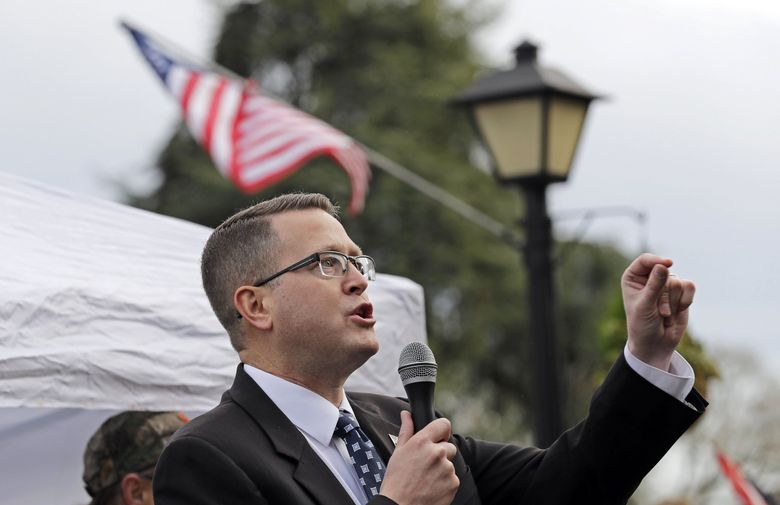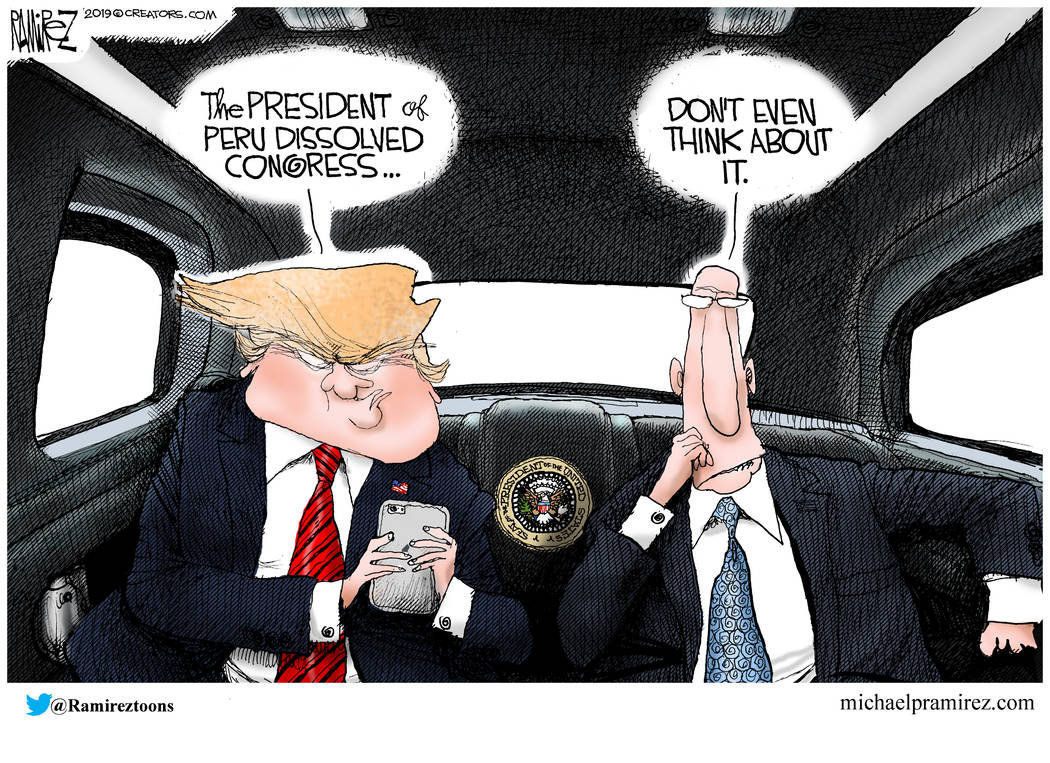Eighty-one percent of Evangelicals voted for Donald Trump. We read that most Evangelicals support Trump in similar numbers today. I first met this Evangelical devotion to Mr. Trump (and wrote about it, Trump as Christian) in a conversation with a former neighbor. The primary reason she knew Mr. Trump was on her side was that he had “moved the Embassy to Jerusalem.”
Religious beliefs are complex. It is tricky business to attribute specific religious ideas to a particular person. That said, there is good evidence that Cathy McMorris Rodgers (WA-Congressional District 5) is an Evangelical in the sense I’m about to discuss. Mike Pompeo, our current Secretary of State and formerly a U.S. Representative from Kansas, also holds an Evangelical worldview. One’s worldview, particularly one’s view of the future, has consequences.
So what does an “Evangelical” believe? I take my cues here from a lecture given August 20 at the South Hill Library by Matthew Sutton, professor of history at WSU in Pullman. Professor Sutton grew up and was educated in the Evangelical tradition before pursuing a doctorate in history at UC Santa Barbara. He is the author of several books on protestant religious movements, books often received well both from within and outside modern Evangelicalism.
I grew up in the United Methodist tradition. I remember sermons discussing the term “evangelical” that emphasized its etymology from the Greek words meaning “good news.” For me the word was originally infused with a nebulous idea of “spreading the Good News,” that is, spreading the Gospel of Jesus Christ.
Words evolve. Modern “Evangelicalism” with a capital “E,” according to Professor Sutton, has taken on additional meaning. It is the modern label (preferred by those who espouse it), for what has been called Fundamentalism, Dispensationalism, and Premillennialism. (You can look up these words in Wikipedia. Without a background in Protestant theology you may find yourself in the theological weeds.)
At the core of Evangelicalism is confidence that the future of mankind is predicted in detail by the Bible, specifically, the Bible as interpreted by certain writers and preachers beginning in the early 1800’s. The ideas spread into the popular consciousness through tent revivals and charismatic preachers; more recently, by indoctrination at religious schools like Bob Jones University, Liberty University, and the Moody Bible Institute; and, in the last twenty years or so, spread by electronic media like Youtube and Facebook. The ideas around the End Times prophecies of Evangelicalism are also spread into the popular consciousness as the popular fiction of the “Left Behind” series of books and movies and by the best-selling book, movie, and prime time TV presentation “The Late Great Planet Earth.” The core predictions of the End Times as understood in Evangelicalism and now, increasingly, in the popular consciousness, come mostly from Revelation in the New Testament and Daniel and Ezekiel in the Old Testament.
Central to humanity is a desire to predict the future, to understand it, to have a level of control over it. Religion tries to satisfy this desire by supplying a narrative.
For modern day Protestant Christianity there are basically two narratives: millennialism and premillennialism. I was brought up in United Methodism primarily as a millennialist (although, until recently, I had little understanding of that word). The predominant thought in my upbringing was that Christ would return (the Second Coming) after we diligent Protestants helped set the stage for it, helping to bring the Kingdom of God to earth. In this context the “millennium” refers to a thousand years of the Kingdom of God, NOT the turn of the millennium at the arbitrarily numbered years 1000 and 2000 on the calendar (as I once thought).
In contrast, in the premillennialist belief system which predominates among Evangelicals today, a series of dire events are prophesied to occur before the 1000 years of the Kingdom of God. The intellectual project is to comb current local and world events for the biblically prophesied signs of the End Times: moral decline, religious apostasy, the return of the Jews to Israel (hence, my neighbor’s enthusiasm for Trump’s moving the U.S. Embassy to Jerusalem), wars and rumors of wars, the rise of powerful empires in Rome, Russia, and the Far East, and the rise of the Anti-Christ. This may sound preposterous to those of us outside the Evangelical system of belief, but it is a comforting system of prediction for folks within it. Evangelicals are engaging in intellectual endeavor. They expend an enormous amount of brain power on the interpretation of biblical passages and their application to “signs of the times.” (For one sample, click here.) Each time a prediction fails more effort must be spent to analyze the failure and recalibrate the prediction.
Thanks to Professor Sutton’s lecture, I also recognize that during my upbringing I was buffeted by premillennialist ideas: talk of “The Beast,” the significance of the number “666” in the Book of Revelation, even vague references to something I now recognize as a precursor to “The Rapture.” As a mainline United Methodist these were intriguing ideas, a whole way of viewing the future. I understand the allure. These end times ideas seeped into my consciousness even as the mainstream Methodism in which I was brought up mostly centered on building the Kingdom of God on earth, building it through good works underpinned with what we understood as Christian values: tolerance, forbearance, respect for my fellow man, justice, charity, non-violence, stewardship of God’s creation.
People with a predominantly premillennial, Evangelical worldview see personal and world events through that elaborate system of belief. Surely many self-labelled Evangelical Christians have never stood back and contemplated the system as a whole. Most (including my neighbor) have only a scant notion of the history of the end times belief system that underlies the understanding of the world preached from Evangelical pulpits.
I urge you to explore this system of belief. Learn the words. Get an idea of what the words convey to attuned listeners. The Evangelical end times belief system colors current local and national politics. “Prophecy Conferences” are presented at venues in Spokane Valley at intervals. Pre-millennialist End Times ideas are central to Matt Shea’s 51st State theology and the Redoubter movement in the Inland Northwest.
Consider the likely belief system of candidates and elected officials. Matt Shea is a glaring example, but what of Nadine Woodward? She cannily responds to the WeBeleiveWeVote survey: “As a candidate in the nonpartisan race for Spokane Mayor, I will only focus on local issues that pertain to city government and not national issues. Thank you for the chance to respond to those questions that impact the Mayor’s office,”? Woodward ducks the questions that might have labelled her an Evangelical. She calculates the Evangelical community will vote for her anyway–and she knew she could not afford to turn off swing voters in a city where hard right Evangelicalism might be looked at askance. And who is she kidding when she says the mayoral race is “non-partisan?”
Keep to the high ground,
Jerry
P.S. The label “Fundamentalism” deserves mention. Between 1910 and 1915 a series of ninety essays were published and called The Fundamentals. The money for the publication came from Lyman Stewart, the founder of Union Oil. (click the book name for the detail of its intent). The Fundamentals is widely considered as the foundation of Christian Fundamentalism. Very gradually the label became pejorative. According to Professor Sutton, the preferred term today among most of the groups that follow fundamentalist precepts as set forth in The Fundamentals is Evangelical.


